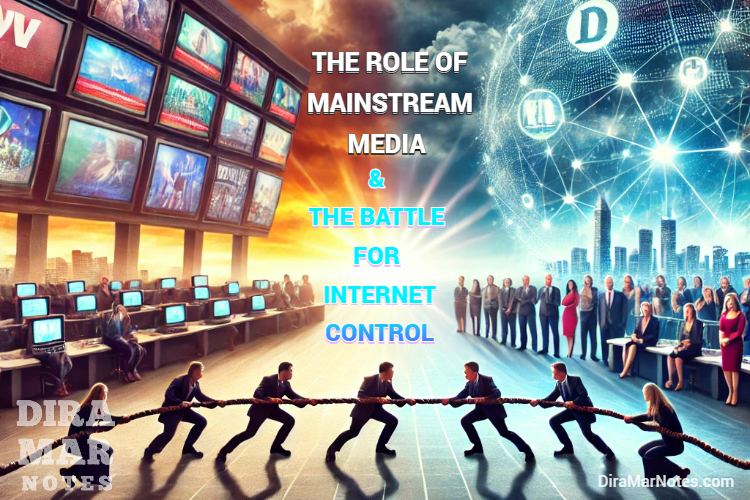
THE ROLE OF MAINSTREAM MEDIA AND THE BATTLE FOR INTERNET CONTROL
In an age where information flows freely, the role of mainstream media in shaping public narratives is facing increasing scrutiny.
While media platforms are often regarded as the cornerstone of democratic discourse, their capacity to control narratives has become a tool for protecting the interests of powerful entities. The interplay between power, truth, and the internet raises significant questions about the future of information freedom.
DISINFORMATION AS A TOOL OF CONTROL
Mainstream media acts as a gatekeeper of information, amplifying or suppressing narratives based on agendas that often serve governments and corporations. Disinformation—whether deliberate or a product of systemic bias—is a potent mechanism used to maintain authority, promote consumerism, and avoid accountability.
Media outlets, while appearing independent, frequently align with the interests of their financial backers, including government bodies, advertisers, or corporate sponsors. This alignment limits investigative journalism and marginalizes dissenting voices, perpetuating a cycle where alternative perspectives struggle to reach the public.
WHY ACCURATE INFORMATION IS FEARED
Truthful reporting poses a direct challenge to established power structures. Here’s why governments and corporations fear accurate information:
- Accountability: Exposing corruption, policy failures, or unethical practices can lead to public backlash, financial losses, and regulatory scrutiny.
- Empowerment: An informed citizenry is harder to manipulate or control. Knowledge enables people to question authority and demand meaningful change.
- Destabilization: Systems built on inequality and secrecy become vulnerable when confronted with the truth.
Whistleblowers, independent journalists, and grassroots movements often face vilification, censorship, or legal threats simply for sharing facts that disrupt official narratives. These efforts to silence critical voices underscore the lengths to which entrenched powers will go to protect their interests.
THE PUSH TO CONTROL THE INTERNET
The internet has revolutionized how information is shared, offering a platform for independent voices to challenge dominant narratives. However, this freedom threatens traditional power structures, prompting efforts to regulate and control the digital space.
Some common tactics used to exert control over the internet include:
- Censorship: Governments press social media platforms to remove content labeled as “misleading” or “harmful,” often using these claims as a pretext to silence dissent.
- Algorithmic Bias: Tech companies prioritize content that drives engagement and profits, sidelining independent journalism and critical perspectives in favor of sensational or sponsored content.
- Restrictive Legislation: Laws aimed at combating misinformation or protecting national security frequently blur the line between addressing genuine issues and curbing legitimate criticism.
Efforts to control the internet under the guise of safeguarding public interest often serve to protect the powerful by suppressing inconvenient truths.
THE RESPONSIBILITY OF THE PUBLIC
In a world where both disinformation and suppression are rampant, the public cannot afford to be passive. To safeguard truth and freedom, individuals must take an active role in seeking and sharing accurate information.
Why You Can’t Be Lazy Anymore
Relying solely on mainstream media is no longer viable. Here’s why we need to take action:
- The Cost of Ignorance: Misinformation and biased narratives influence political decisions, social dynamics, and even personal choices, often to harmful effect.
- Shaping the Future: A well-informed public is essential for holding power to account and fostering a more equitable society.
How to Take Action
- Diversify Your Sources: Avoid relying on a single news outlet. Seek out multiple perspectives, including those from independent and international media.
- Verify Information: Before accepting or sharing information, cross-check it with reliable sources and fact-checking platforms.
- Understand Bias: Learn about the ownership and funding of media outlets to recognize how their interests shape their reporting.
- Support Independent Journalism: Smaller outlets often operate free from corporate or political influence. Supporting them through subscriptions or donations helps sustain unbiased reporting.
- Engage Critically: Question the intent and omissions behind every narrative. Who benefits from this story? What’s missing?
Don’t Just Consume—Participate
Beyond seeking accurate information, you can take steps to amplify truth and combat disinformation:
- Share Reliable Information: Use your platform to promote verified facts and encourage constructive conversations.
- Demand Accountability: Advocate for greater transparency from governments, corporations, and media organizations.
- Join Movements: Support initiatives that protect press freedom, internet neutrality, and whistleblower rights.
FINAL THOUGHTS
The fight against disinformation is not just a struggle for truth—it’s a battle for freedom, democracy, and justice. Governments and corporations may fear accurate information, but the public holds the power to demand transparency and accountability.
By rejecting complacency and actively seeking the truth, we can ensure that voices of integrity continue to challenge the status quo. The future of information freedom depends on us—and the time to act is now.



